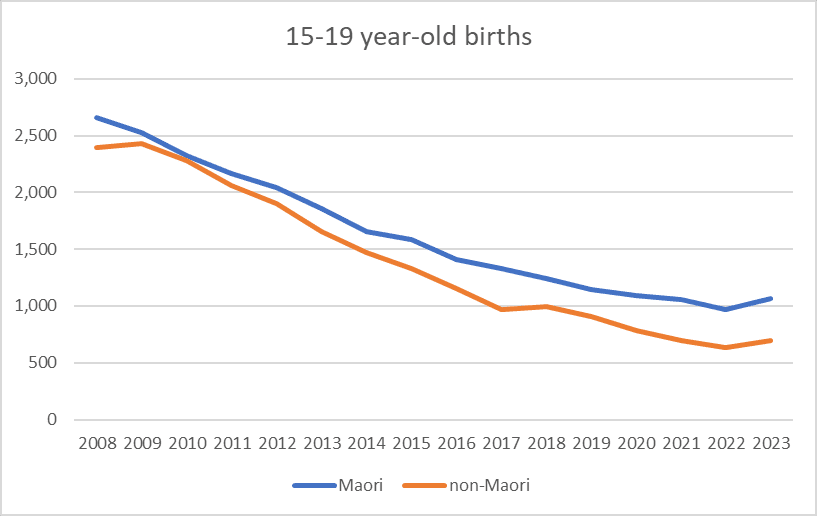Table of Contents
The heavily promoted narrative, which has ramped up over the last six years, is that Maori somehow have special vulnerabilities which arise from outside forces they cannot control; that contemporary society fails to meet their needs. They are not receptive to messages and opportunities in the same way as other races because the trauma of colonisation carried from one generation to the next.
We are told, whether it’s health or education, Maori cannot be reached, or cannot access, or cannot receive current ‘best practice’ because it is couched in racism. Until our institutions look through a Maori worldview lens, inequity and injustice will continue. Progress will be impossible. These are the circumstances that New Zealand’s academic institutions and public agencies have accepted, embraced and acted on.
So I have a conundrum for them.
Teenage births are considered, by many, to be undesirable. Sixty years ago they led to shot-gun marriages; thirty years ago (and since) to long-term dependence on welfare. They often lead to undesirable outcomes for offspring. After all, teen-age mothers are barely more than children themselves, and the biological fathers of their children seldom actively participate in parenting.
But as females became better educated and independent, they themselves started to question the wisdom of premature pregnancy and all that it entailed. In an ultra-connected world, reality TV programmes like Sixteen and Pregnant followed the lives of teenage mothers, exposing the difficulties and hardships they experienced and were viewed by millions worldwide.
Health authorities put ever increasing efforts into reducing teen births through contraception education and availability, especially new long-acting reversible contraceptives and the morning-after pill. Secondary schools provided more guidance and advice.
In terms of welfare reform, where births were not prevented, the Ministry of Social Development got closer to the mothers, exercising control of their benefit money, connecting them to mentors, ensuring GP enrolment and keeping them in study. Unconditional cash stopped.
From youth surveys it seems young people are increasingly delaying sex and /or avoiding pregnancy.
The result?
Teenage births have plummeted BUT for Maori and non-Maori alike (as did abortions by the way).

Whatever factors are driving this steep decline, Maori females responded in exactly the same way as non-Maori females.
This phenomenon gives lie to much of the hitherto described propaganda which is now pushed as ‘fact’.
Yes, Maori teenage births are still more common – and still leading to benefit dependence – but that’s actually another issue.
The point here is, regardless of ethnicity, teenage girls are subject to and responding to the same social stimuli in the same way.
Maori females are throwing a spanner into the works. They challenge the current orthodoxy.
Perhaps the orthodoxy is unsound?









